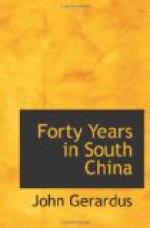“This is a great blow to the English Presbyterian Mission in this place. It is also, because of the intimate relations of the two missions and the oneness of the churches under our care, a great blow to us. It is a great blow to the whole mission work in China—greater, perhaps, than the loss of any other man. You will not wonder that I, from my long intimacy with him, feel the loss deeply, more and more deeply every day and week, as the days and weeks pass away without him.”
CHINESE GRANDILOQUENCE.
An episode in connection with the visit to China in 1878 of Dr. Jacob Chamberlain, of the Arcot Mission, is described in a letter to Dr. Goyn Talmage, as follows:
“Dear Goyn: I suppose I told you about the pleasant visit we had from Dr. Chamberlain and family. The Doctor went with me to Chiang-chiu. While there his carpet-bag was stolen out of the boat. We reported the case to a military officer, and told him that we wanted the bag very much, and if he could get it for us, we should make no trouble about having the thief punished. In a few days after our return to Amoy the bag was sent to us with all its contents complete. We bought an umbrella—a nice silk one—and sent it up to the officer as a present. Perhaps you would like to see a translation of the letter he sent in reply. It will illustrate Chinese politeness. The letter reads as follows:
“’When the flocks of wild geese make their orderly flight,—the glorious autumnal season deserving of laudation,—my thoughts wander far away to you, Teacher Talmage, whose noble presence is worthy to be saluted with bow profound, and whose dignified manners invite to close intimacy. Alas, that our acquaintance should have been formed at this late day!—and that, too, when, by wafting and by the plying of oars, having arrived at ’the stream of the fragrant grain fields’ (poetic name for the region of Chiang-chiu), you met with the mishap of doggish thieves taking advantage of your want of watchfulness! Truly, the blame of this rests on me. How, then, can I have the hardihood to receive from you a present of value! A reward of demerit, how can I endure it! During the three stages of life, (youth, middle age, and old age,) I shall not be able to repay. It is only by inheritance (not by my own merit) that I obtained the imperial favor of office. Thus, my deficiency in the knowledge of official laws and governmental regulations has subjected you to fear and anxiety. Shame on me in the extreme! shame in the extreme! Only by the greatest stretch could I hope to meet with forbearance, how then could you take trouble and manifest kindness by sending a present. Writing cannot exhaust my words, and words can not exhaust my meaning. It will be necessary to come and express my thanks in person. Such are my supplications and such is my sense of obligation. May there be golden peace to you, Teacher Talmage, and will your excellency please bestow your brilliant glance on what I have written!’




